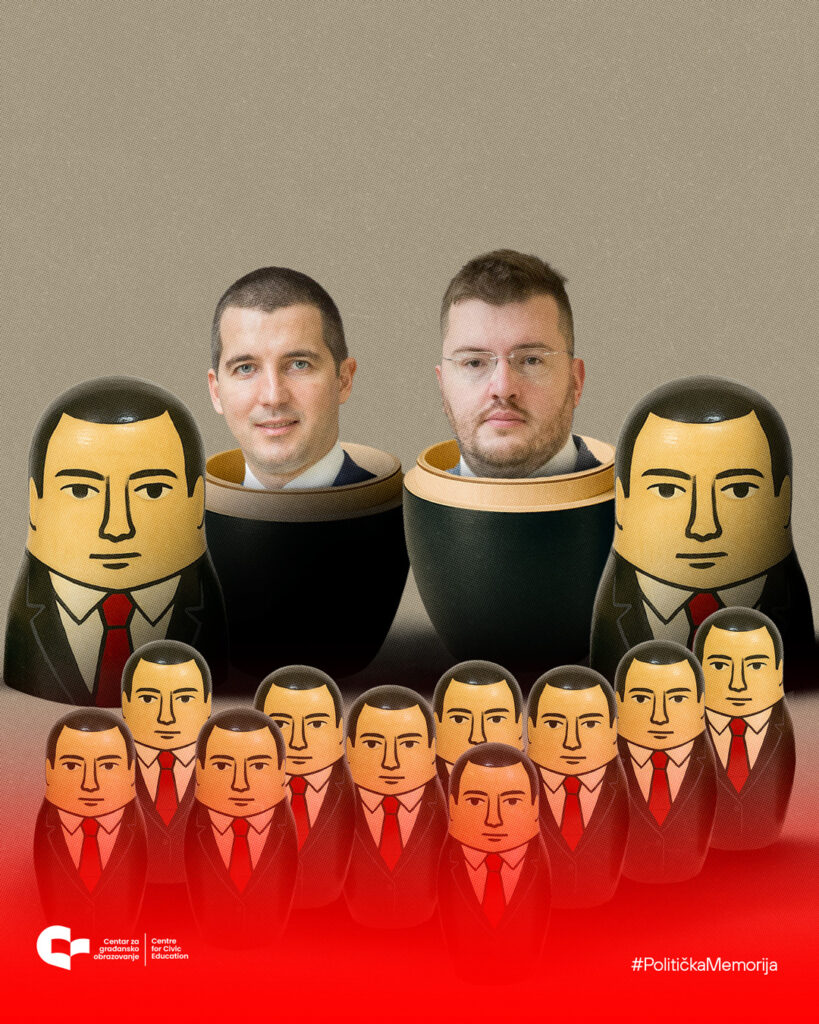Centre for Civic Education (CCE) has been continuously highlighting, for nearly a decade, the inefficiency of the organization of the executive branch in Montenegro. The current structure, with a record 32 members and overlapping responsibilities, represents an absurd and unnecessary burden on public resources, as an outcome of balancing party interests. Through a series of reviews of the official activities of individual government members, the CCE emphasizes the need for a model of a smaller and more efficient government, this time through the examples of Deputy Prime Ministers Aleksa Bečić and Momo Koprivica from Democratic Montenegro.
Previous reviews focused on Minister without Portfolio Milutin Butorović from PES, DPM for Education, Science and Religious Affairs Budimir Aleksić from NOVA, and DPM for Infrastructure and Regional Development Milun Zogović from DNP.
Upon the formation of the 44th Government of Montenegro on 31 October 2023, Aleksa Bečić assumed the role of DPM for Security, Defense, Fight Against Crime and Internal Policy, and Momo Koprivica became DPM for Political System, Judiciary, and Anti-Corruption, among the then five deputy prime ministers. Since then, their number has grown to seven. Bečić and Koprivica have been the most active among them, according to data from their government web pages – Bečić with 251 activities and Koprivica with 103. Statistically, over 19 months, Bečić averaged around 13 activities per month, and Koprivica around five.
Regarding DPM Bečić, over 30% of his 251 recorded activities were of a protocol nature, primarily congratulations (as many as 74), as well as telegrams or condolences (5). He consistently congratulated all municipalities on their municipal days, and regularly extended greetings for religious and national holidays, police actions, Ministry of Interior operations, international observance days, and even to foreign officials. The largest portion of his engagements were meetings, receptions, and encounters – 80 in total – mainly with foreign officials, ambassadors, representatives of international and domestic organizations, as well as ministers and party colleagues Šaranović and Krapović, and sessions of the Bureau for Operational Coordination of the Intelligence-Security Sector (BOC). Notably, Bečić had no officially recorded meetings with NGO sector representatives, contrary to his prior practice as Speaker of Parliament. Furthermore, his portfolio included 49 responses and press releases, particularly lauding police actions, even for minor successes, while omitting criticism even after serious failings in the security sector. His other activities included attending or participating in events or visits (34), three media appearances or announcements published on the Government’s website, and six official trips – three to Brussels, and one each to The Hague, Warsaw, and the USA.
Of the 103 recorded activities of DPM Momo Koprivica, the largest number also comprised meetings, receptions, and encounters – 46. These were followed by responses and statements – 25, congratulations – 16, event participation and visits – 10, official trips – five, and one media appearance. Koprivica’s official travels included Lithuania, China, Austria, North Macedonia, and France. He met with many ambassadors and representatives of international organizations and institutions, as well as domestic figures such as Special State Prosecutor Vladimir Novović and Montenegro’s Chief EU Negotiator Predrag Zenović, as well as the Metropolitan of Montenegro and the Littoral, Joanikije. In terms of civil society, he officially met with representatives of the National Democratic Institute (NDI) and the NGO 35mm.
According to publicly available information, in April Aleksa Bečić’s salary was 1848.34 EUR, while Momo Koprivica’s was1860.07 EUR. At the same time, both maintain cabinets consisting of five advisors each, ten in total, seven of whom are affiliated with Democratic Montenegro.
Aleksa Bečić’s advisors include political scientist Sandra Radević, who also serves as Secretary General of the Democrats and was previously his advisor while he was Speaker of Parliament; electrical engineer Božidar Radinović, who also heads the Democrats’ IT sector; economist Marija Nikčević, the party’s head accountant; dentist Valentina Minić, a party official and former advisor during Bečić’s parliamentary presidency; and student Mitar Paunović, the youngest among his advisors and the Democrats’ spokesperson.
Momo Koprivica’s cabinet is somewhat more diverse. It includes Professor Emeritus Milan Popović from the Faculty of Law; Vladan Raičević, a criminology and security expert and former MP of the Movement for Changes (PzP); and Gordana Krcunović, MA, a teaching associate at the Faculty of Philosophy in Nikšić. Among party-affiliated advisors are political scientist Branko Vuković, former councilor of the Democrats in Podgorica, and Nihad Rastoder, member of the Democrats’ Municipal Committee in Petnjica.
In line with their party’s approach, DPMs Bečić and Koprivica actively promote their work, though Bečić is far more represented on the party’s official channels—which is partly expected, as he is also the party’s president. However, it is evident that Koprivica receives significantly less exposure through those platforms. On party social media, Bečić is referred to as Vice Prime Minister, although such a designation does not exist in official Government documents, yet is frequently used even in posts on his personal page.
All of this points to the current model of executive power prioritizing party positioning, protocol, and PR narratives over reforms and substantive work in the public interest. Overlapping competences, focus on symbolic rather than substantive activities, and party-line hiring further erode trust in institutions. Without changing this approach, it is difficult to expect a more efficient, accountable, and citizen-oriented Government.
Nikola Mirković, Programme Associate

